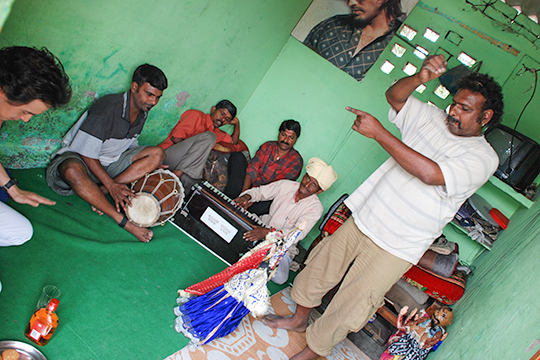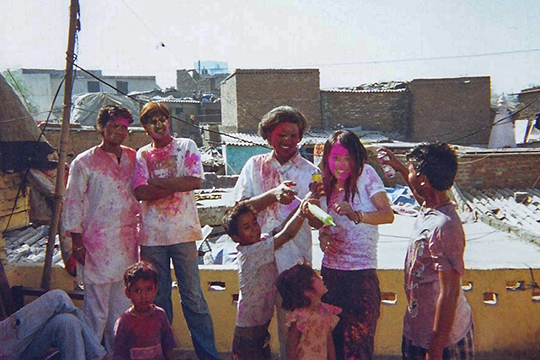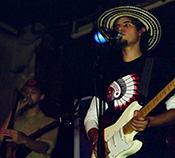Musical Education to Brighten the Future of Impoverished Children.
(Part 1)
Haruka Kosaka / Music journalist
The Intriguing Worlds of India and Classical Music.
The music journalist Haruka Kosaka has launched a project to teach children from deprived areas of India to play classical musical instruments as a new means of earning income. Slums and classical music — she told us how these two worlds became the essence of her project.
On my first visit I was amazed to see a world where happiness took so many diverse forms.
Though mainly a journalist of classical music, I recently organized a project to teach underprivileged children in India how to play musical instruments. The project focuses on a community of professional street performers and their families. They come from a social group historically regarded as the fifth-varna, outcastes under the former caste system, referred to by some as Dalits. Today they earn their livelihoods as skilled artists, some as musicians and others as street performers of other types. People of their social standing still command less respect in Indian society, which can make it difficult for them to earn a living. It occurred to me one day that classical music instruments would add great value to their vocational repertoire. With instruments unrelated to the religiously tainted biases that persist in their society, they can gain more performing opportunities and increase their earnings. This is the core concept of my project.
How did I, a music journalist from Japan, come to be involved in a charity in faraway India? The story dates back to a trip I took to India in my university days. One of my high school teachers recommended that I travel to India. In a brief journey of only two weeks, I gained a new perspective of the world by seeing a country of diverse peoples and cultures living together and finding happiness of diverse forms, changing the mistaken vision I had of India before going as a materially deprived country where the people persevered against adverse life circumstances while adhering to strict religious rules. I never imagined they would be so happy.
Building rapport with Indians to bridge the many differences in our values.
The people of India behave very differently from the ways I am accustomed to in Japan. Refreshing reminders of the differences come to me every now and then while staying in India. Once, an Indian friend of mine gave me some walnuts. I told my friend that I would eat them later, when I could get my hands on a nut cracker. My friend took the walnuts over to the door and cracked them in the hinge. Indians tend not to worry about things like not having a proper tool or scattering shells over the floor. They take a simple, practical approach to solve a problem at hand. Through many repeats of episodes like this, it has dawned on me how impractical and restraining one’s principles and preconceptions can be.
My early visits to India left me with the deep impression that the prosperous lives we live in Japan come partly at the expense of impoverished people from different parts of the world. This is why I chose development aid as the field for my postgraduate degree. I decided to do my research fieldwork in India, a country where people lived myriad lifestyles that never ceased to intrigue me. I did my fieldwork in a slum in Delhi, where I came to know the community of street performers with whom I now work in my project. I spent more than six months with these people for my research, gaining insight into their lives and even into their private thoughts, discovering much that an outsider would never normally know. I learned, for example, that beneath their deference towards the NGO staff who offered them jobs, they clearly understood that some of the staff looked down upon them as members of a lower caste. Rather than confronting discriminatory attitudes like this, they tactfully went through the motions required to handle whatever situation was at hand. As I spent more time with them, giving interviews and such, I came to see how they distinguished between external and private thoughts, much in the way the Japanese do. I also discovered that they cherished their small enjoyments in everyday life. My fondness for them grew as my research progressed. By the time I drafted my thesis, they were more like friends to me than participants of a study.

People’s values are exciting to learn in both India and the world of classical music.
Back home in Japan, I wanted to share what I saw and learned in India with as many people as possible. To acquire the communication and writing skills to do so, I took a part time job at a classical music journal while pressing ahead with my graduate research. The job was a stroke of good luck, as it allowed me to engage my ten years of experience playing classical piano as a child. Luckier still, a shortage of staff at the journal brought me the opportunity to go abroad to interview up-and-coming pianists at a competition.
I cherished every moment of my interview trip, discovering yet another new world I had never before experienced. The interviews were an introduction to the world of classical musicians and the viewpoints of accomplished pianists. While the people were different from the Indian street performers on many levels, the excitement they inspired in me was just what I had felt in India. I was determined to learn more about the intriguing world of classical music and the world views of artists. Upon completing my graduate studies, I decided to stay with the publisher and start an editorial career.

- Haruka Kosaka / Music journalist
- A freelance journalist specializing in classical music, Haruka Kosaka first took an interest in India while traveling the country as a student. Later she studied slum communities in India for her postgraduate degree, working and living with a community of street performers for over six months. In 2018 she launched a project to give children from those communities an education in classical music. In the same year she published Kin no Himawari - Memories of pianist Hiroko Nakamura (2018, Shueisha).
Interview Date:



